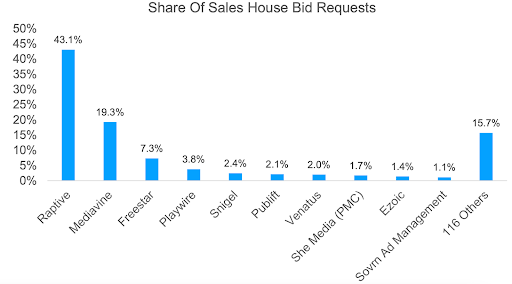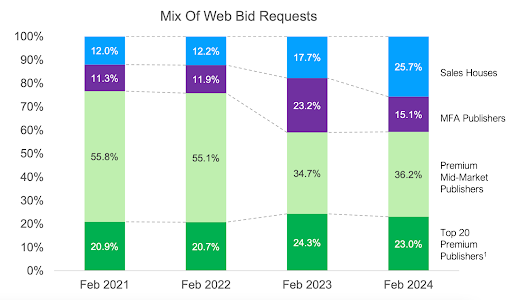 |
||||||||||||
|
||||||||||||
| Trouble on the Horizon for Mid-Market Publishers |
|
Jounce Media released its March 2024 RTB Supply Path Benchmarking Report, which looks at data collected across 1,358,015 websites, 830,078 mobile apps, and 26,814 connected TV apps.  A Squeeze in the Middle In addition to “crowding out” mid-market publishers, the sales house captures a third of DSP spend and is radically changing the type of inventory available to DSP buyers. Jounce predicts that mid-publishers, unable to match the level of resources sales houses bring to the table, will have little choice but to join them, relinquishing a part of their revenue. “Mid-market publishers appear to be reluctant to hand over the keys to a sales house, but mid-market publishers are also unable to make the necessary investments to achieve in-house monetization excellence. The outcome is a squeeze of the middle,” the report notes. The squeeze is seen in the number of bid requests for mid-market publishers, which has dropped from 56% to 36% over the past three years  Media and brands may not be aware that their DSP spend is increasingly concentrated on smaller publishers. They should take steps to better understand their purchase inventory through the open exchanges. — SS
|
|
| Another Reason to Invest in Diverse Media: Younger Consumers Value It |
| For certain generations, “I don’t see color” is the phrase used to indicate they eschew race-based discrimination. Okay, boomer. Millennials and Gen Zers aren’t buying it. Not only do they see color, but they also embrace it and favor brands that embrace it, according to a new study by Direct Digital Holdings (DDH) and Horowitz Research, “Cracking the Code: How Multicultural and Gen Z Reshape Mainstream Marketing.” Going further, younger generations note when different demographics are excluded. DDH surveyed 2,300 consumers and found that 81% of Gen Z say their brand preferences and choices are significantly influenced by multicultural and diverse people, as did 72% of Millennials. This contrasts with 48% of Gen Xers and just 32% of Boomers. Generational differences aside, today, many consumers (57%) say that multicultural people impact their brand preferences and choices, which represents an important tipping point. “Multicultural and diverse audiences may be the most important force in consumer marketing today — and soon will dominate the landscape,” the report notes. That shift is inevitable as diverse populations grow. Social circles, especially among Millennials and Gen Z, are growing more diverse alongside the population shift. Purchasing Power of Gen Z All brands and publishers need to pay attention to Gen Z's attitudes. Their purchasing power in the U.S. alone will top $360 billion, and their news consumption patterns will affect publishers in the future. Brands that want to reach and engage this critical demographic will need to focus on minority-owned news organizations and diverse journalists, as well as TikTok and other social media platforms where Gen Z gets their news. — SS |
| The Buy Side Calls Out the Sell Side for ID Bridging…Is it Fraud? |
| Chrome’s third-party cookie deprecation plans have caused plenty of drama, but I don’t know if anyone predicted this debacle. Buy-side tech platforms have accused publishers and tech firms of using deceptive practices to identify audiences. Driven by signal loss, these tactics obscure digital marketing effectiveness and complicate conversion tracking and frequency capping. DSPs determine audiences using third-party cookies, but with browser changes, sell-side platforms allegedly use undisclosed methods, like ID bridging, which some equate to fraud. Despite discussions within the IAB Tech Lab, transparency remains a concern. The legitimacy of these practices varies, with some using legitimate methods while others are questionable. DSPs are discovering discrepancies between bid requests and ad delivery, hindering conversion tracking. Many DSPs were unaware until recent conversations, while some, like Quantcast, noticed earlier. According to Paul Bannister, Chief Strategy Officer at Raptive, ID Bridging involves linking user identifiers across platforms. Instead of relying solely on third-party cookies, DSPs utilize BuyerUIDs to decide on bidding for users. Publishers can enhance targeting by connecting BuyerUIDs with user email addresses, making users more valuable to advertisers. However, misuse is possible, highlighting the need for industry standards to distinguish legitimate practices from abuses. It's crucial for publishers and SSPs to carefully select partners and adhere to regulations to maintain trust and ensure responsible use of ID Bridging. — AB |
| Netflix and Facebook's Alleged Sleazy Partnership to Create Tailored Ads |
| Allegations in court documents suggest Meta allowed Netflix access to Facebook users' private messages for nearly a decade, purportedly violating antitrust and privacy regulations. The lawsuit, filed by Maximilian Klein and Sarah Grabert, claims a special relationship between Netflix and Facebook, facilitating tailored ads. Netflix reportedly spent millions on Facebook ads, with Reed Hastings, Netflix's co-founder, playing a role in closing Facebook Watch. The documents mention agreements granting Netflix access to Facebook's private messaging through APIs. Meta denies sharing private messages, stating agreements allowed users to message friends about Netflix content. In the past, Facebook reportedly authorized Spotify and Netflix to access DMs, contributing to growth and ad revenue. Meta has faced fines for data breaches, including a $284 million fine from Ireland and a $725 million settlement related to Cambridge Analytica's misuse of user data. — AB |
 |
|||||||||||
 |
|||||||||||
|
|||||||||||
 |
|||||||||||
|
| @{optoutfooterhtml}@ |









